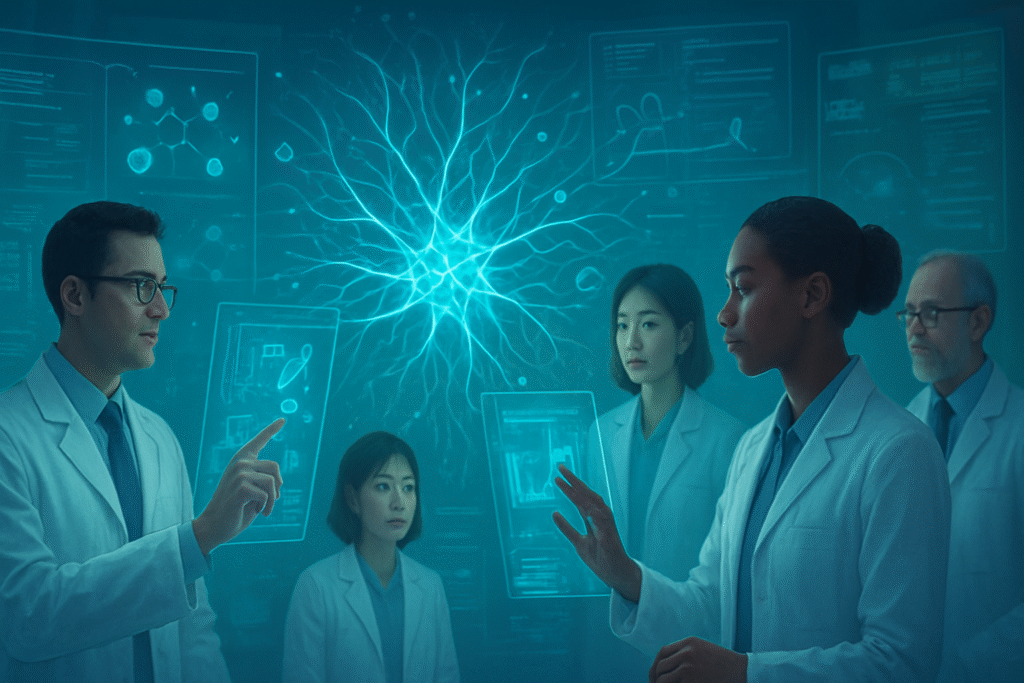
The pharmaceutical sector stands at the precipice of a profound transformation, driven by the relentless march of artificial intelligence (AI) and other advanced technologies. As highlighted by industry observers like PharmTech.com, rapid workforce upskilling is no longer a luxury but a critical necessity for companies aiming to thrive in this new era. The immediate significance of this shift is multifaceted, touching upon every aspect of drug discovery, development, manufacturing, and commercialization.
This urgent need for upskilling stems from a fundamental pivot towards data-intensive processes, a growing AI skills gap, and the accelerating pace of technological change. AI is not merely optimizing existing workflows; it is fundamentally redefining roles and creating entirely new ones, demanding a workforce equipped with advanced digital, analytical, and critical thinking skills. Without proactive and agile upskilling initiatives, pharmaceutical companies risk stalled innovation, increased operational costs, and a significant erosion of their competitive edge in a rapidly evolving global landscape.
The Algorithmic Revolution: Technical Shifts Reshaping Pharmaceutical R&D and Manufacturing
The integration of AI into the pharmaceutical sector marks a paradigm shift from traditional, often laborious, and empirical methods to highly precise, data-driven, and predictive approaches. This algorithmic revolution is manifesting across several key areas, demonstrating capabilities far exceeding previous methodologies and eliciting strong reactions from both the scientific and industrial communities.
One of the most significant advancements lies in AI-driven drug discovery and target identification. AI algorithms, particularly those leveraging machine learning (ML) and deep learning (DL), can analyze vast datasets of biological, chemical, and clinical information to identify potential drug candidates and novel therapeutic targets with unprecedented speed and accuracy. This differs markedly from traditional high-throughput screening, which, while effective, is often slower, more expensive, and less capable of identifying complex relationships within molecular structures or disease pathways. For instance, AI can predict the binding affinity of molecules to specific proteins, optimize molecular structures for desired properties, and even generate novel molecular designs, drastically reducing the time and cost associated with early-stage research. Initial reactions from the AI research community emphasize the potential for AI to unlock previously intractable biological problems and accelerate the identification of first-in-class drugs.
Beyond discovery, AI is revolutionizing clinical trial design and optimization. Natural Language Processing (NLP) and ML models are being used to analyze electronic health records (EHRs), scientific literature, and real-world data to identify suitable patient cohorts, predict patient responses to treatments, and optimize trial protocols. This contrasts with older, more manual methods of patient recruitment and trial management, which often led to delays and higher costs. AI's ability to identify subtle patterns in patient data allows for more personalized trial designs and potentially higher success rates. Furthermore, AI-powered predictive analytics are enhancing pharmacovigilance by rapidly sifting through adverse event reports to detect safety signals much faster than human-led processes, moving from reactive monitoring to proactive risk assessment.
In pharmaceutical manufacturing, AI is driving the shift towards "Pharma 4.0," enabling predictive maintenance, real-time quality control, and optimized production processes. Machine vision systems coupled with deep learning can inspect products for defects with superhuman precision and speed, while ML algorithms can predict equipment failures before they occur, minimizing downtime and improving operational efficiency. This moves beyond traditional statistical process control, which often relies on sampling and can be less responsive to dynamic changes. The industry's initial reactions underscore the potential for AI to significantly reduce waste, improve product consistency, and enhance supply chain resilience, though experts also highlight the need for robust data governance and explainable AI to ensure regulatory compliance and trust in autonomous systems.
Competitive Dynamics: AI's Reshaping of the Pharma and Tech Landscapes
The increasing integration of AI into the pharmaceutical sector is not just transforming internal operations; it's fundamentally reshaping the competitive landscape for established pharmaceutical companies, burgeoning AI startups, and tech giants alike. This development creates clear beneficiaries, intensifies competition, and portends significant disruption to existing market positions.
Major pharmaceutical companies such as Pfizer (NYSE: PFE), Novartis (NYSE: NVS), and Roche (SIX: ROG) stand to benefit immensely from strategic AI adoption. By leveraging AI in drug discovery, clinical development, and manufacturing, these companies can accelerate their pipelines, reduce R&D costs, and bring innovative therapies to market faster. Those that successfully integrate AI will gain a significant competitive advantage in terms of drug efficacy, speed to market, and operational efficiency. However, the challenge lies in effectively upskilling their vast workforces and integrating AI into complex legacy systems, which can be a slow and arduous process. Companies that fail to adapt risk falling behind in innovation and efficiency, potentially losing market share to more agile competitors or AI-native biotechs.
The competitive implications for AI labs and tech giants are also profound. Companies like Google (NASDAQ: GOOGL), Microsoft (NASDAQ: MSFT), and Amazon (NASDAQ: AMZN) are increasingly positioning themselves as crucial partners for pharma, offering cloud computing infrastructure, AI platforms, and specialized machine learning services. Their expertise in data processing, algorithm development, and scalable AI solutions makes them indispensable to pharmaceutical companies lacking in-house AI capabilities. This creates a new revenue stream for tech giants and deepens their penetration into the highly lucrative healthcare sector. Furthermore, specialized AI startups focusing on drug discovery (e.g., BenevolentAI, Recursion Pharmaceuticals (NASDAQ: RXRX)), clinical trial optimization (e.g., Antidote Technologies), or precision medicine are emerging as significant disruptors. These agile firms, often unburdened by legacy systems, can rapidly develop and deploy AI-driven solutions, challenging the traditional R&D models of established pharma.
This dynamic environment also leads to potential disruption to existing products or services. Contract Research Organizations (CROs) and Contract Development and Manufacturing Organizations (CDMOs) that do not embrace AI and offer AI-enabled services may find their traditional offerings becoming less competitive. The market positioning of companies will increasingly depend on their ability to attract and retain AI talent, form strategic partnerships, and demonstrate tangible ROI from their AI investments. Strategic advantages will accrue to those who can effectively combine deep scientific domain expertise with cutting-edge AI capabilities, creating a synergistic effect that accelerates innovation and optimizes value chains.
A New Frontier: Broader Significance and Societal Implications of AI in Pharma
The ascendance of AI in the pharmaceutical sector is not an isolated phenomenon but a critical component of the broader AI landscape, reflecting a wider trend of AI permeating highly specialized and regulated industries. This integration holds immense significance, promising transformative impacts while also raising important societal concerns and drawing parallels to previous technological milestones.
This development fits squarely into the broader AI landscape as a prime example of domain-specific AI application, where general AI capabilities are tailored and refined to address complex challenges within a particular industry. It underscores the maturity of AI algorithms, moving beyond generalized tasks to tackle highly nuanced problems like molecular interaction prediction or complex biological pathway analysis. The pharmaceutical industry's embrace of AI also signifies a broader trend towards data-driven decision-making and predictive analytics becoming central to scientific research and industrial processes globally. It highlights the increasing recognition that vast datasets, when properly analyzed by AI, can yield insights far beyond human cognitive capacity.
The impacts are potentially revolutionary. On the positive side, AI promises to accelerate the discovery and development of life-saving drugs, potentially reducing the time and cost associated with bringing new therapies to market. This could lead to more affordable medications and a faster response to emerging health crises. Precision medicine, where treatments are tailored to an individual's genetic makeup and disease profile, will become more attainable, leading to more effective and safer interventions. Economically, it could spur significant growth within the biotech and pharmaceutical sectors, creating new jobs in AI development, data science, and bioinformatics, even as other roles transform.
However, these advancements are not without potential concerns. The most prominent include data privacy and security, especially when dealing with sensitive patient information for clinical trial optimization or pharmacovigilance. Ethical considerations surrounding algorithmic bias in drug discovery or patient selection are also paramount, as biased AI could exacerbate health inequalities. The "black box" nature of some advanced AI models raises questions about explainability and interpretability, which are critical for regulatory approval in a highly scrutinized industry. Furthermore, the rapid transformation of job roles necessitates careful planning to avoid widespread workforce displacement without adequate reskilling opportunities.
Comparing this to previous AI milestones, the current integration of AI in pharma can be likened to the advent of genomics in the early 2000s or the introduction of robotic automation in manufacturing. While those advancements revolutionized their respective fields, AI's potential impact is arguably more pervasive, touching every stage of the pharmaceutical value chain from conceptualization to commercialization. It represents a shift from automation of physical tasks to automation and augmentation of cognitive tasks, marking a new frontier in scientific and industrial progress.
The Horizon: Future Developments and Expert Predictions
As AI's footprint in the pharmaceutical sector continues to expand, the horizon is filled with exciting near-term and long-term developments, promising to further reshape how drugs are discovered, developed, and delivered. However, realizing this potential will require addressing significant challenges.
In the near-term, we can expect to see more sophisticated AI models for drug repurposing and combination therapy identification. Leveraging existing drug libraries and vast clinical data, AI will become even more adept at identifying new uses for old drugs or optimal combinations of therapies, accelerating treatment options for complex diseases. Furthermore, the integration of AI with advanced robotics in automated labs will become more prevalent, creating "lights-out" drug discovery facilities where AI designs experiments, robots execute them, and AI analyzes the results, creating a truly autonomous R&D loop. We will also see increased adoption of federated learning approaches to leverage diverse datasets across multiple institutions without compromising patient privacy, a crucial step for real-world evidence generation.
Looking further ahead, AI-driven personalized medicine will move beyond genomics to integrate multi-omics data (proteomics, metabolomics, etc.), real-time physiological monitoring from wearables, and environmental factors to create hyper-individualized treatment plans and preventative strategies. Experts predict the rise of "digital twins" of patients, AI models that simulate individual responses to various treatments, allowing for virtual clinical trials and highly optimized therapeutic interventions. Another area of significant promise is de novo drug design, where AI doesn't just optimize existing molecules but generates entirely novel chemical entities with desired therapeutic properties from scratch, potentially leading to breakthrough therapies for currently untreatable conditions.
However, several challenges need to be addressed. Data standardization and interoperability across disparate datasets remain a major hurdle. Developing explainable AI (XAI) models is critical for gaining regulatory approval and building trust among clinicians and patients. Ethical frameworks for AI in healthcare, particularly regarding bias and accountability, need to be robustly developed and implemented. Furthermore, the talent gap will continue to be a significant challenge, necessitating continuous investment in education and upskilling programs to ensure a workforce capable of developing, deploying, and managing these advanced AI systems. Experts predict a continued convergence of biotechnology and information technology, with successful pharmaceutical companies transforming into "bio-tech" entities, deeply rooted in both biological science and advanced AI.
The AI Revolution: A Concluding Assessment of Pharma's Transformation
The rapid integration of AI and advanced technologies into the pharmaceutical sector represents a pivotal moment, marking a fundamental shift in how the industry operates and innovates. The imperative for rapid workforce upskilling is not merely a response to technological change but a strategic cornerstone for future success, ensuring that human capital can effectively harness the power of AI.
The key takeaways from this transformation are clear: AI is accelerating drug discovery, optimizing clinical trials, and revolutionizing manufacturing processes, promising faster, more efficient, and more personalized healthcare solutions. This shift is creating new competitive dynamics, benefiting agile AI startups and tech giants while compelling established pharmaceutical companies to undergo significant digital and cultural transformations. While the potential benefits—from life-saving drugs to enhanced operational efficiency—are immense, critical concerns around data privacy, ethical AI, and the need for explainable models must be proactively addressed.
In the grand narrative of AI history, this development stands as a significant milestone, demonstrating AI's capacity to move beyond generalized tasks and deliver tangible, life-altering impacts within a highly complex and regulated scientific domain. It parallels previous industrial revolutions, but with a unique emphasis on cognitive augmentation and data-driven intelligence. The long-term impact will be a pharmaceutical industry that is more precise, predictive, and personalized, fundamentally altering how we approach health and disease.
In the coming weeks and months, industry observers should closely watch for continued strategic partnerships between pharma and tech, new regulatory guidelines specifically addressing AI in drug development, and the emergence of innovative upskilling programs. The success of these initiatives will dictate the pace and extent of AI's transformative power in delivering the next generation of medical breakthroughs.
This content is intended for informational purposes only and represents analysis of current AI developments.
TokenRing AI delivers enterprise-grade solutions for multi-agent AI workflow orchestration, AI-powered development tools, and seamless remote collaboration platforms.
For more information, visit https://www.tokenring.ai/.






